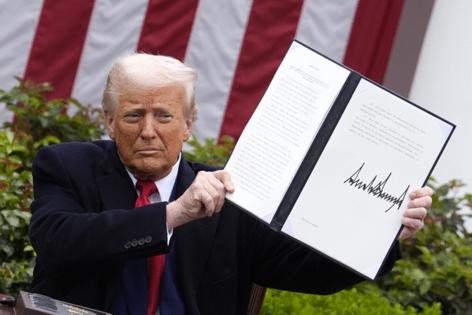Trump testing limits of presidential power, scholars say
Published in Political News
Defying the courts can bring significant consequences. Past presidents have sent the military when Southern governors refused to integrate schools.
But what if the refuser is the president?
“The president is in charge of the military,” said Michael Meyerson, a constitutional law professor at the University of Baltimore. “He’s the commander in chief.”
Therein lies the rub as President Donald Trump pushes closer to a showdown with the courts over the deportation of a Maryland man and other immigrants to El Salvador, legal and presidential scholars say.
They use words like “brazen,” “terrifying,” and “unprecedented” to describe how Trump is testing the limits of presidential power, as well as the checks and balances that are supposed to come from the other two branches of government.
The professors say that while the courts have been upholding their branch by responding to Trump’s deportations — part of a campaign promise to crack down on illegal immigrants — the Republican-controlled Congress as an institution has largely sidelined itself.
“Our government was designed knowing whoever has power will likely abuse it,” Meyerson said. “But they never thought Congress would give up their power. The major thing they did not imagine was the political parties.”
Trump campaigned on a promise to carry out mass deportations of people who entered the U.S. illegally, saying it would protect American jobs, reduce crime and deter future illegal immigration.
Two deportation cases are proceeding on separate tracks: In Greenbelt on Tuesday, U.S. District Judge Paula Xinis demanded that Trump administration officials be deposed on what if anything they’ve done to comply with her order to facilitate the return of Kilmar Abrego Garcia, who they have said was mistakenly deported to a notoriously brutal prison in El Salvador. On Friday, Maryland Sen. Chris Van Hollen said Abrego Garcia told him he had been moved to a different facility.
And in Washington on Wednesday, U.S. District Chief Judge James E. Boasberg threatened contempt proceedings against the administration for violating his March order, which required it to turn around planes that were delivering deported men to the El Salvador prison.
The Supreme Court earlier this month said Xinis’ order properly requires the government to facilitate Abrego Garcia’s return, but it should be clarified to avoid intruding on the executive branch’s authority over conducting foreign affairs.
Meyerson said the high court has not exerted its full power for now as the judicial process continues to play out.
“They’re hoping to avoid a major confrontation. You do not want the president saying, ‘Come and get me,'” Meyerson said.
That caution is warranted, given the implications for presidential power not just now but in the future, according to one political scientist.
“Any action a president takes has the potential to create precedent,” said Meena Bose, who directs the Peter S. Kalikow Center for the Study of the American Presidency at Hofstra University in New York. “We’re seeing how much room a president has to take action.”
By nature, the executive branch can act more quickly than the legislative and judicial branches, she said.
“There is a very aggressive president and executive branch that acts now and asks questions later,” Bose said. “We see the courts responding fairly rapidly. The question of Congress, that’s a little more complicated.”
With congressional Republicans largely falling in line in support of Trump, today’s situation is much different from what President Richard Nixon faced during the Watergate crisis, she said. Then, both a Supreme Court decision and eroding support from his own Republican party ultimately contributed to Nixon’s resignation in August 1974.
It’s challenging for scholars to compare today’s events to anything that has happened in the past.
“We’ve never been here before,” said Mark Graber, a constitutional law professor at the University of Maryland.
“We’re sending people to something that resembles a concentration camp in El Salvador,” he said, noting that as someone who lost family in the Holocaust, he doesn’t use that term lightly. “We send people there without being given a chance to say, ‘You’ve got the wrong person.'”
Graber said the courts have tools at their disposal to compel the administration to obey the rule of law. And indeed, both Xinis and Boasberg are on course to consider contempt proceedings, although it remains to be seen who specifically would be jailed or otherwise punished if found in contempt.
“If this were me, and the judge said, ‘Graber, you’ve got to turn the planes around,’ and I flew them anyway, I would be in jail by that evening,” he said.
“We can start with the person showing up in court,” he said of the Justice Department attorneys arguing Trump’s case.
He also sees a role for bar associations at some point, taking away licenses of the government lawyers who he sees as having “betrayed the rule of law.”
Ultimately, though, this may be a battle that “will be won on the streets rather than in the courtroom,” he said.
“People should be mobilized to demand better of the government,” Graber said.
Meyerson said he thinks we might be “one missed Social Security payment and two crashed planes” from more people becoming angered by the Trump administration — “when it stops being just about, ‘we hate trans people, we hate immigrants.'”
Despite the “terrifying” events of recent weeks, Meyerson said he does not believe the country is in a constitutional crisis — yet. With midterm elections coming up next year, people will have their say on their congressional representatives.
“This is a constitutional crisis if people cannot vote out the people they disagree with. Then they can’t protect themselves at all,” he said. “The check and balance was always the ballot box.”
_____
©2025 The Baltimore Sun. Visit at baltimoresun.com. Distributed by Tribune Content Agency, LLC.




























































Comments